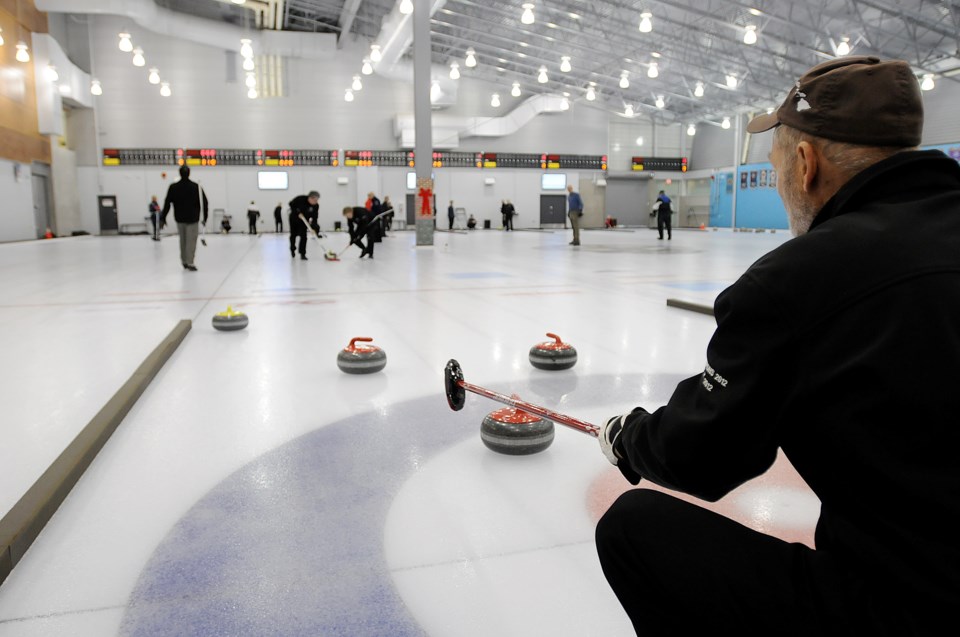When Jessie Sanderson tells her friends she is a curler, the 23-year-old is usually met with a look of puzzlement.
“It’s a very big question mark,” said the Coquitlam resident, a third on the Kesa Van Osch team that represented B.C. at the recent Scotties Tournament of Hearts Canadian women’s curling championships in Montreal.
“Curling is not a very big sport in Vancouver. We would like it to be [bigger], so if there was a big event it would help the curling world in the Lower Mainland.”
There actually was a pretty big curling event in Vancouver just over four years ago. Large crowds jammed into the 6,000-seat curling facility at Hillcrest Park to watch Kevin Martin’s rink from Edmonton win the 2010 Olympic gold medal and Cheryl Bernard’s Calgary team take the silver.
Of course that was the Olympics, which is a big deal. Vancouver residents like big deals, and that’s exactly the reason why the city will probably never see another major curling competition like the Scotties or the Brier, which is the Canadian men’s championship.
“I don’t think there’s an appetite [for curling] in Vancouver,” said Warren Hansen, director of event operations for the Canadian Curling Association and a Vancouver-area resident.
“The sport is not familiar enough for people to simply come out because there is a major curling event.”
Cities like Winnipeg, Edmonton, Calgary and Saskatoon have hosted successful Scotties and Briers.
The Brier is currently being held in Kamloops. Other B.C. cities like Victoria and Prince George have played host to Canadian and world championships.
The CCA’s venture into Montreal this year met with lukewarm success. The association would love to bring its most prestigious events to large cities like Toronto and Vancouver, but doesn’t want to take a financial bath.
It costs around $2 million to host a Scotties, said Hansen. A Brier costs anywhere from $2.6 to $6 million, depending on the city and size of venue.
Scott Braley, executive director and CEO of Curl B.C., said Vancouver has a solid base of around 2,000 curlers.
“The question is, is Vancouver too big?” he said. “It tends to be challenging in Vancouver because there are so many things going on. People have so many options.”
Finding the right venue can be like Goldilocks and the Three Bears. It can’t be too big or too small.
The Olympic curling venue has been converted to a multi-purpose recreation centre.
It remains the home of the Vancouver Curling Club but no longer has the seating capacity to host a major event.
Rogers Arena is too big, said Braley. The Pacific Coliseum could work if seating was restricted to the lower bowl.
The Agrodome is old and only seats around 3,000.
One possibility is the Doug Mitchell Thunderbird Sports Centre, which has hosted David Cup tennis events. The centre has a seating capacity of 6,200 and drew over 17,800 over the weekend when Canada upset Spain.
“It would be a good venue to look at… although going out to UBC is a bit of a trek for some people,” said Braley.
Hansen explored the possibility of bringing curling to the Richmond Oval, site of long-track speed skating at the Olympics.
The cost of adding seats and making the building curling friendly was prohibitive.
“Unless somebody is prepared to come up and financially help us in a major way, it’s just not economically viable,” said Hansen.
Vancouver does have some curling history. The Brier was last held here in 1978. Curling legend Sandra Schmirler won her last Scotties title in Vancouver in 1997.
The world curling championships were held in 1987.
Hansen said the biggest obstacle curling would face in Vancouver is perception. The sport just isn’t cool enough for most residents.
“It’s an interesting thing about curling,” said Hansen.
“Despite the fact of everything we have done over the last 25 years, curling in Canada still has a stigma about it.
“The young people in the U.S. think the sport is cool. They think it’s something they would like to do. We tend not to get that in Canada because the sport still has a stigma.”



